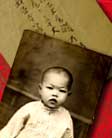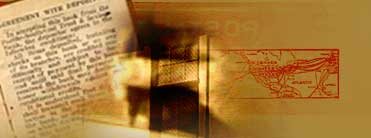|
  
interrogations - Hearings whereby U.S. immigration officials would rigorously question an immigrant about precise information regarding their exempt status, personal relationships, and/or life. Questions would include detailed information about such minutiae as: the number and location of residences in a village; the birth date of each immediate or extended family member; the nature of both natural geographical and man-made features (e.g. ponds, bamboo groves, ancestral halls, and even latrines). This testimony would be used to try to determine whether blood relationships were indeed genuine or contrived, as well as to corroborate the testimony of other relatives and fellow villagers.
land / landed / landing - The process by which a person arrives on and enters American soil from another country.
"living widows" (also, "grass widows") - Term applied those wives of Chinese not allowed to join their husbands or bring their families to America. The phrase reflects the long periods of separation from their husbands endured by these women.
National Archives and Records Administration (NARA) - The Federal agency mandated to store, manage, preserve, and provide access to valuable, non-current Federal records of historic, legal, or fiscal value. 14 NARA facilities are located throughout the United States serving as important depositories of archival records (e.g. text, maps, illustrations, still photographs, film/video), frequently used for genealogical research, scholarly works, documentaries, and many other endeavors.
"natural feet" - See "bound feet".
naturalization / Naturalized Citizen - The process of or someone being given citizenship by a country by virtue of conveyance rather than by right of birth.
Page Act of 1875 - Considered the beginning of Asian centric exclusion laws aimed at banning Chinese, Japanese, and Mongolian "coolie labor", felons and prostitutes from the United States. Act is named after California Congressman Horace F. Page.
"paper sons" - Term given to male Chinese who attempted to enter America by assuming false identities or purchasing fraudulent paper documents claiming to be the son of a Chinese person in an exempt classification allowed entry under the Chinese Exclusion Act. The "paper son" system encouraged Chinese in America to claim numerous "sons" in an effort to create more "slots" for bringing over extended or falsified family members. There were also "paper daughters", but in considerably fewer numbers since America was considered a hostile environment for most Chinese, much less Chinese women. Additionally, for cultural and practical reasons, it was deemed both more appropriate and financially productive to send males to America to be the productive wage earners.
Pearl River Delta Region - The agricultural heartland that spans the Southeastern province of Guangdong, China. Many impoverished Chinese farmers and laborers migrated from this area, beyond China's borders, to other regions of Asia, and eventually became the predominant group to migrate to the United States during the Exclusion period.
"Picture Brides" - Term given to the brides of Japanese immigrants and residents in America who primarily selected their wives by viewing photographs of potential brides. Marriages were by proxy, with the selected bride arriving at an American port of entry to await their husbands who would verify their identity and confirm their marriage arrangement to immigration authorities.
return certificates - A court case clarified that the Treaty of 1880 between the United States and China guaranteed the right of Chinese residents in the United States to travel to and from America to China, and back, but from that point on Chinese laborers would have to obtain "return certificates" for such travel.
Section 6 Certificates - The Chinese Exclusion Act required the Chinese Government to issue certificates verifying the identity of "every Chinese person other than a laborer" entitled to come to the U.S.. These certificates stated the title or official rank, age, height and "all physical peculiarities" of the person to be admitted.
sojourners - People that migrate from their homeland to another country or region to find employment and enhance their livelihood, but then returns to their native country and families. Though this term was frequently aimed at early Chinese immigrants in a negative manner, many immigration scholars have since observed and documented that major European groups also practiced this same pattern of mobility and search for economic opportunity.
stowing away / stowaway - The process of or a person that hides on a ship, train, or other means of transportation to obtain free passage or bypass authorities.
Sun Yat Sen - Known as the "founding father of modern China", he formed the Revolutionary Alliance to resist and overthrow the rule of the Qing, a collection of powerful warlords. He became the first provisional President of the new Republic of China, thus bringing to an end thousands of years of dynastic rule.
Toisan / Toisanese - A district (and the associated Chinese dialect of spoken language for that district) located in the Southeastern province of Guangdong in China. Part of an agriculturally based area also known as the Pearl River Delta region, it is one of three districts known collectively as "Sam Yup" (literally "three districts) region. As many as half of the emigrants that eventually traveled to North America and Australia during the Exclusion era came from Toisan alone.
War Brides Act / "war brides" - In response to largely the European occupation of American troops throughout Europe during WW II, the wives of American service men were allowed to enter the United States. This was later expanded to also allow for fiancées as well. Many Chinese U.S. service men took advantage of this benefit to bring over both new and "previous" brides to America.
Previous Page | Back To Top
|





